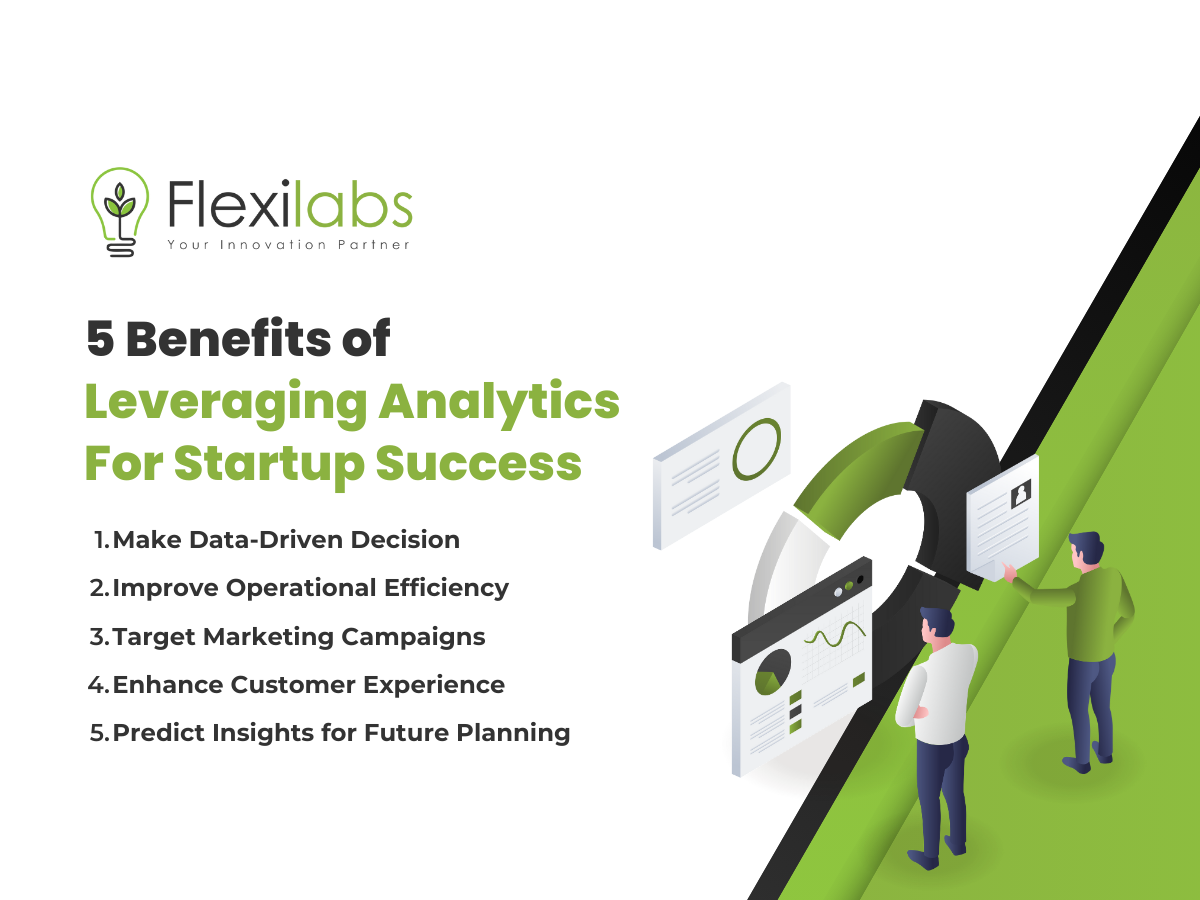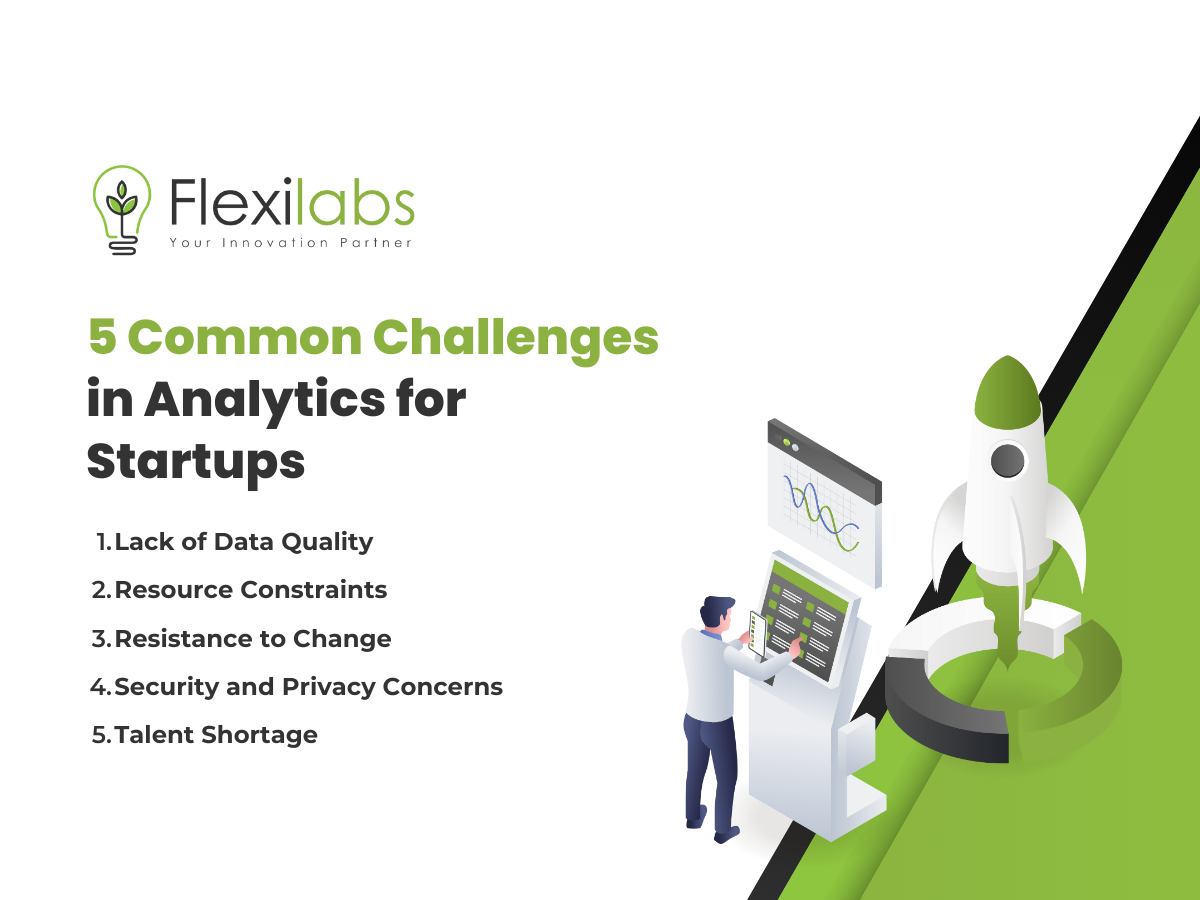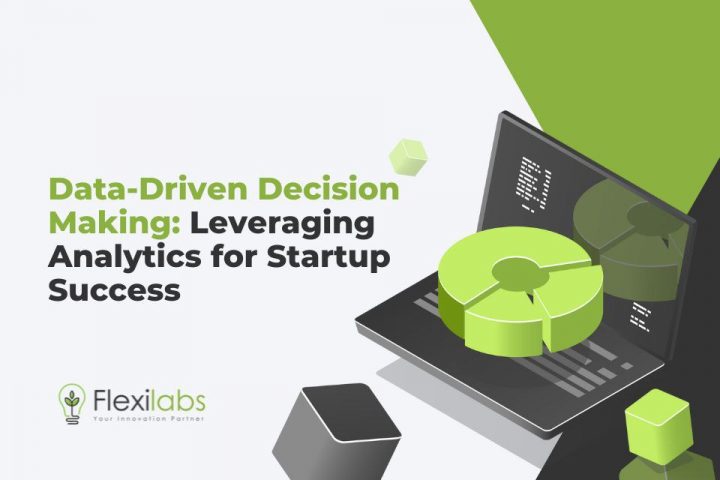In the dynamic landscape of startups, where uncertainty is the only constant, making informed decisions is crucial for success. In recent years, data-driven decision-making has revolutionised how businesses operate, and startups are no exception.
This article explores the significance of data-driven decision-making for startups, introducing key strategies, tools, and insights in analytics for startups.
Importance of Data-Driven Decision-Making For Startups
Startups operate in an environment of rapid change, resource constraints, and high stakes. Every decision can impact the trajectory of the business, making the need for informed choices imperative. This is where data-driven decision-making comes into play, offering startups a compass in the tumultuous sea of entrepreneurship.
Data-driven decision-making relies on complex data and analysis rather than intuition or gut feeling. For startups, this approach offers several advantages. Firstly, it mitigates the risks associated with uncertainties, enabling entrepreneurs to make strategic decisions with a higher probability of success. Secondly, it provides a competitive edge by allowing startups to adapt swiftly to market changes and customer preferences.
5 Benefits of Leveraging Analytics For Startup Success

As mentioned, leveraging analytics can give startups several vital advantages contributing to their success. It can be a game-changer for startups, allowing them to make data-driven decisions, improve efficiency, target their audience effectively, enhance the customer experience, and gain insights for future planning.
Likewise, here are five benefits of incorporating analytics for startups.
Better Data-Driven Decision Making
One of the primary benefits of analytics for startups is the ability to make informed decisions backed by concrete evidence. Analytics enable startups to make informed decisions based on factual data rather than relying on gut feelings or intuition.
Startups can analyse historical data, market trends, and customer behaviour to make strategic choices that align with their goals. Likewise, startups can better understand their audience and industry dynamics, leading to more strategic, effective decision-making and recession-proofing their business.
Improved Operational Efficiency
Analytics tools can help startups optimise their internal processes and workflows. Analytics tools can streamline processes within a startup, leading to improved efficiency.
By tracking and analysing key performance indicators (KPIs), startups can identify bottlenecks, streamline operations, and allocate resources more efficiently. This leads to cost savings and improves overall operational efficiency.
Targeted Marketing Campaigns
Analytics for startups can help create targeted and personalised marketing campaigns. By analysing customer preferences, behaviour, and demographics, startups can tailor their marketing efforts to specific audience segments.
This improves the effectiveness of marketing campaigns and enhances customer engagement and satisfaction.
Enhanced Customer Experience
Understanding customer needs and preferences is a cornerstone of startup success. In this case, analytics empowers startups to gather and analyse customer data. They help identify pain points, preferences, and trends. Startups can optimise their products or services to meet customer needs better.
Thus, this creates products or services that resonate with their target audience. This customer-centric approach can increase customer satisfaction and positive word-of-mouth. Likewise, startups can foster customer loyalty and gain a competitive advantage.
Predict Insights for Future Planning
Analytics for startups allows businesses to predict future trends and outcomes based on historical data. This predictive capability is invaluable for long-term planning and strategy development. Startups can anticipate market changes, identify emerging opportunities, and proactively adapt their business models to stay ahead of the competition.
5 Common Challenges in Analytics for Startups

While the benefits of data-driven decision-making are evident, startups often face challenges in implementing and leveraging analytics effectively. Understanding and addressing these challenges is essential for long-term success.
Lack of Data Quality
One common challenge of analytics for startups is the lack of high-quality data. Only accurate or complete data can lead to misguided decisions. Startups should invest in data quality assurance measures, including regular data cleaning, validation, and verification.
Resource Constraints
Startups, especially in their early stages, may face resource constraints. Limited budgets and workforce can hinder the implementation of sophisticated analytics solutions. In such cases, startups can prioritise essential analytics tools and gradually expand their capabilities as they grow.
Resistance to Change
Introducing a data-driven culture within a startup may face resistance from team members accustomed to traditional decision-making approaches. Leadership should actively communicate the benefits of data-driven decision-making and provide training and support to facilitate a smooth transition.
Security and Privacy Concerns
As startups collect and analyse sensitive data, ensuring security and privacy is paramount. Implementing robust cybersecurity measures, compliance with data protection regulations, and transparent communication with customers regarding data usage are essential to building trust and mitigating risks.
Talent Shortage
Hiring skilled data analysts or data scientists can be challenging for startups, especially when competing with larger companies that can offer higher salaries and more extensive benefits. The shortage of talent in analytics can hinder a startup’s ability to leverage data effectively for strategic decision-making.
5 Key Strategies for Implementing Data-Driven Decision-Making In Your Startup
To prevent the previously mentioned challenges and maximise the use of analytics for data-driven decision-making, startups are required to implement a strategic approach to analytics for startups. So, to help you with that, here are five key strategies for startups:
Define Clear Objectives
Before diving into data analysis, startups must define clear objectives. Take note of the specific goals you aim to achieve. Then, identify the key areas where data can significantly impact your startup’s success.
This ensures that the data you collect and analyse directly contributes to measuring success. Whether increasing customer engagement, optimising marketing ROI, or improving product quality, having well-defined objectives provides a roadmap for data analytics for startups.
Invest in Data Quality and Integration
Data-driven decision-making relies on the availability of accurate and relevant data. Reliable and integrated data sets form the foundation for meaningful analysis, allowing decision-makers to trust the insights derived from the data.
In this case, startups must always ensure the accuracy and reliability of their data. As a startup owner, you should implement analytics tools, conduct new customer surveys, or leverage existing databases. Then, always integrate data from various sources to create a comprehensive and unified view of your business operations.
Assemble a Team of Analytics Talent
Having the right talent is crucial for effective data-driven decision-making. Startups should invest in hiring or training professionals with expertise in data analytics in business. This could include data scientists, analysts, or business intelligence specialists who can interpret data and provide actionable insights.
Build a Data-Driven Culture
Another strategy for analytics for startups is building a data-driven culture. A culture that embraces data-driven practices encourages continuous learning and adaptation. Likewise, it creates an environment where insights are actively sought and utilised.
Thus, as a startup founder, you should cultivate a culture within your organisation that values and prioritises data-driven decision-making. This may involve promoting employee data literacy, encouraging data use in discussions and decision processes, and recognising and rewarding individuals or teams that leverage data effectively. Then, enable all team members to use data in their decision processes and provide training to enhance data literacy across the organisation.
Implement Agile Analytics
The startup environment is fast paced, requiring agility in decision-making. Implementing agile analytics involves using iterative and flexible approaches to data analysis. Rather than waiting for exhaustive reports, startups can benefit from quick, actionable insights, allowing rapid adjustments and improvements.
In this regard, begin with a focused and manageable analytics initiative rather than attempting to analyse all aspects of the business at once. Starting small allows the startup to test the effectiveness of analytics strategies, identify challenges, and iterate on processes. As the organisation becomes more comfortable with analytics, it can gradually expand its scope and complexity.
Implement Robust Analytics Tools and Technologies
Effective data analysis relies on powerful tools and technologies that facilitate data processing, visualisation, and interpretation. Likewise, remember to choose and implement advanced analytics tools and technologies that align with your business needs.
These tools should facilitate efficient data analysis, visualisation, and reporting. Here are five essential tools and technologies for practical data analysis:
- SQL (Structured Query Language). SQL is a standard language for managing and manipulating relational databases. It allows analysts to query databases to retrieve, control, and analyse data.
- Python and R Programming Languages. Python and R are widely used programming languages for data analysis and statistical modelling. They offer extensive libraries and frameworks that provide powerful tools for data manipulation, statistical analysis, and machine learning.
- Excel or Google Sheets. For primary data analysis and visualisation, spreadsheet software like Microsoft Excel or Google Sheets remains a widely used tool. These platforms provide functionalities for sorting, filtering, and creating charts and graphs. While they may not be as powerful as specialised tools for complex analyses, they are user-friendly and readily accessible.
- Tableau. Tableau is a powerful data visualisation tool that allows users to create interactive and shareable dashboards. It connects to various data sources and simplifies the creation of visually appealing charts and graphs.
- Apache Spark. Apache Spark is an open-source, distributed computing system that facilitates big data processing and analysis. It provides a fast, general-purpose cluster-computing framework that supports in-memory processing and iterative algorithms.
Regularly Monitor and Evaluate Data Processes
The last tip in analytics for startups is monitoring. Regular reviews can help identify areas for improvement, allowing your organisation to evolve its data-driven strategies over time.
As such, consistently implement a system for regularly monitoring and evaluating your data processes. This includes assessing the accuracy of data inputs, evaluating the effectiveness of analytics models, and ensuring that data-driven insights align with business objectives.
The Future Of Data-Driven Startups
In conclusion, the era of data-driven decision-making has ushered in a new paradigm for startups. As technology advances, the tools, and techniques available for data analysis will become more sophisticated, offering startups unprecedented insights into their operations and markets.
And those who embrace analytics as a core component of their strategy are better positioned for success in the long run. In this case, startups should stay abreast of emerging analytics, machine learning, and artificial intelligence trends to maintain a competitive edge.
So, what are you waiting for? Adapt to this trend and take your startup to the next level with data-driven decision-making. And if you need further advice, Flexilabs is always here for you! Contact us now!

